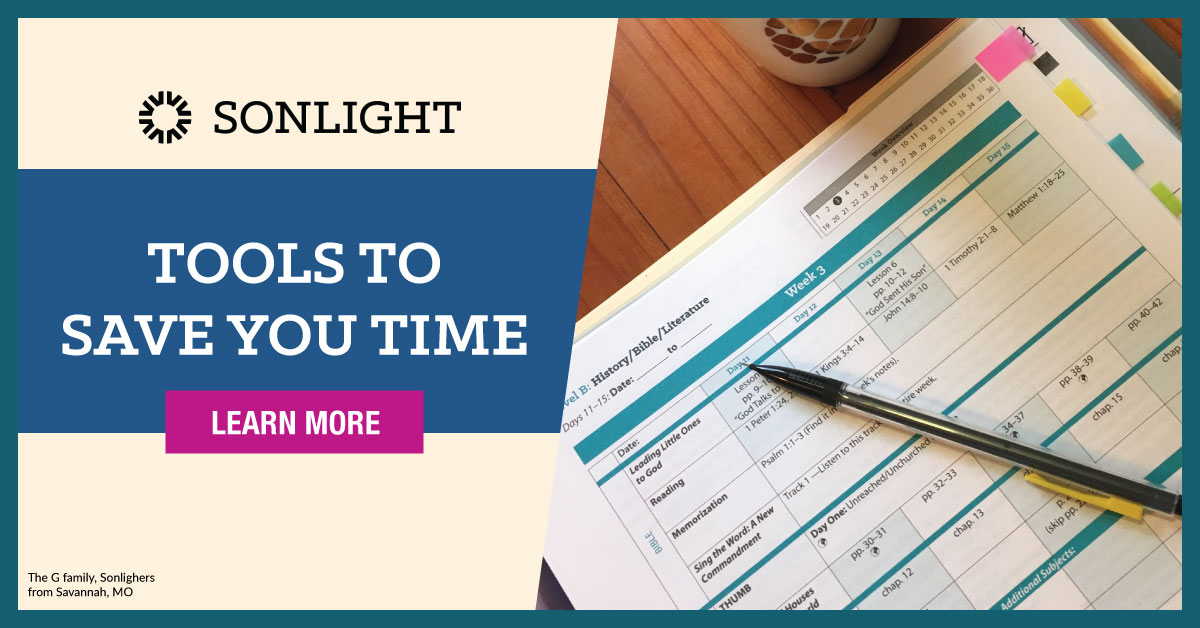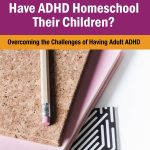
When I visit homeschool blogs, I see parents who have it all together.
- Some have great tips for how to fill out a planner. Those parents have confidence that once the planner is filled, it’s going to be fairly accurate all year and not need to be erased and revamped at least weekly. That’s not what my planner looks like.
- Other blogs have beautifully coordinated activities they planned weeks in advance. While I do add a lot of extras and activities, I tend to always be playing catch-up and always plan more than I manage to accomplish. When it comes to extra projects, we tend to either not have the supplies on hand because I forgot to plan ahead, or I will forget about them until we are three weeks past the book they coordinate with.
- There are parents who have a consistent weekly routine, where they tend to get the same things done at the same time every week. I, on the other hand, face dozens of hurdles that derail my plans on an almost minute-by-minute basis.
I have ADHD (Attention Deficit Hyperactivity Disorder). And homeschooling seemed insurmountable for me at first.
I had only one student my first year, and even then getting organized and staying on track seemed to be beyond what I could manage. There were always hundreds of things to do that seemed equally important. I always wanted to try every new thing and sample every new program, but I had very little motivation to finish any of them. I had to teach myself how to do things that come instinctively to others, such as being consistent, establishing a routine, and prioritizing.
Why Is Teaching with ADHD So Much Harder?
Teaching with ADHD is far more difficult than teaching without ADHD. This list of ways is long, but if it describes you, don’t lose hope. There are methods that can help you overcome.
The symptoms of ADHD seem to contradict best practices when it comes to teaching. Instead of being organized, disciplined, and a good master of time, people with ADHD tend to exhibit all the opposites.
- Hyperactivity: Reading aloud and helping children with math problems is hard for a parent who always wants to be on the move since these tasks require staying in one place for an extended period of time.
- Impulsivity: I have a hard time resisting buying more programs than we have time for, and then trying to do them all anyway. I also am constantly wanting to interrupt what we are doing to try something else or add something I forgot about.
- Disorganization: As hard as I try to keep things organized, something always seems to be missing just about the time I am ready to start homeschooling. At the grocery store, I always seem to forget the one thing we need for our science projects. We’ve neglected entire subjects for weeks at a time due to my lack of organization.
- Problems Prioritizing: Deciding what to do next (or even what to do first) is very difficult when everything seems important. Deciding what to leave out is even harder. What makes it more difficult is when the priorities change from day to day or minute to minute.
- Difficulty Making Decisions: There are times I feel like every decision is a big decision. Whether to break now for a meal when my children are getting restless or keep on reading to the end of the chapter because I know it will be hard to come back to it later... Whether to do math first or reading first...I see hundreds of details to factor into making every decision. And each option seems almost equally important.
- Poor Time-Management Skills: Planning can be an issue if I don’t allow adequate time for our activities. We are constantly going over and under our allotted times, with the majority taking longer than I planned for, meaning we run out of time to do it all. I also struggle with getting places on time, so I don’t sign us up for a lot of activities.
- Difficulty Focusing: With six children constantly interrupting and asking questions, focusing becomes harder and harder as our day goes on. As the pressure to make decisions and stay on tasks builds, so do my headaches.
- Struggle with Follow Through: For me, trying new things is exciting. Finishing them, however, does not often provide me with a sense of satisfaction. This means I am far more likely to try something new than to ever finish it.
- Frequent Mood Swings: My brain is very busy, all day long. It is constantly going through hundreds of thoughts, all of which seem important because of the problems with prioritizing, and most thoughts lead to more thoughts.
- Racing Thoughts: It wasn’t until I was almost 30 that I realized most people don’t think the way I do. Have you ever read the joke about getting older, where the person starts a task, such as going out to wash their car, but get sidetracked by the mail, the fridge, and watering the plants, and by the end of the day, they are worn out but have accomplished almost nothing? That’s a good description of how my brain thinks almost every minute of every day. I’m constantly bombarded by hundreds of thoughts at once, and each thought leads to another, until another homeschooling day has passed, and I’m barely halfway down the list. This constant barrage of thoughts interrupts the thoughts I’m currently having, and so I get easily distracted and forget to stay on task.
How Can I Make Teaching with ADHD Manageable (And Even Successful)
Because of my daily struggles with symptoms of ADHD, many might think I can’t enjoy homeschooling or I have a hard time teaching. That couldn’t be further from the truth.
While I do have my share of problems to overcome, I have, with the help of my husband, children, and friends, managed to develop some awesome coping techniques. In addition, homeschooling is actually one of my most peaceful times of day. When I use a well-laid out schedule like the one Sonlight provides, and have a great routine built up, I have fewer concerns, fewer racing thoughts, and am able to relax and enjoy my children (and myself) more.
Sonlight’s Instructor’s Guides have helped me so much, because much of what I needed is built right in. The schedule is laid out, so I don't have to decide what to do first. Each assignment is broken into small, manageable assignments to fit into a certain time frame. It is beautifully organized and has a variety of activities which balance my impulsivity. Because Bible and prayer are part of Sonlight’s plan, I can easily start off our sessions in the right mindset and keep going longer.
Here are tips to make counteract the symptoms of ADHD in your homeschool.
- Hyperactivity: Build activity into your day. Schedule breaks as often as you need them. Incorporate high-activity exercises, such as vigorous cleaning, going for a walk, or playing with your children to break up longer periods of inactivity.
- Impulsivity: Use your impulsivity to your advantage. Instead of interrupting your plan to do something impulsive, use finishing your day as a reward to do whatever impulsive project or activity you would like to try.
- Disorganization: Instead of allowing my disorganization to run amok, I have taken to being overstocked whenever possible. I try to buy crayons and tape in bulk during the summer school supply sales and keep a healthy stock of printer paper and pipe cleaners on hand. If we do suddenly find ourselves needing a random supply, I quickly order it online so I don’t have to try to remember it on our next trip to the store. Also, when I am feeling behind and overwhelmed (and can’t seem to remember that I’m not really behind anyone except the imaginary picture of where I think I ought to be that’s in my head), I take a few days or a week off, and catch up so I can start fresh and feel more on-track.
- Problems Prioritizing: Color-coding with markers and sticky notes helps me prioritize: very important things in red, fairly important things in purple, and so on.
I also like to use a master list to help me keep track of everything. It’s just one big list, and it’s a mess. There are things scribbled everywhere: bills to pay, stops to make, things I don’t want to forget six months from now, and more. Often, my list runs over several pages and can get very detailed. At the beginning of a day when I know I have a lot of time to get things done, I’ll highlight all the things I want to get done, and cross them off as I go.Every few days, I use an app on my phone (Due) and transfer over everything I want my phone to remind me about, or things I need to do more than once, so I don’t forget. When my list gets too messy to read, I make a new one with everything that isn’t crossed off yet. - Difficulty Making Decisions: I often have my children take turns making less important decisions for me. “What’s for lunch today, Child A?” “Should we take a break now, or keep going, Child B?”
If I have to make the decision myself, I might make a quick list and let and online random number generator pick for me. If I don’t like what it chose, then I know that’s not a decision I want to make, and try again with my shorter list. This reduces the number of actual decisions I have to make. - Poor Time-Management Skills: I would rather have more time left over than I thought I would than to constantly run out of time, so I tend to budget about twice as much time as I think I’ll need. I keep a small list of extra activities (typing, games, etc.), so if we do have extra time, I can just have someone choose something from the list.
- Difficulty Focusing: I have worked hard with my children to reduce the number of distractions they provide. For example, if they have a question while I am reading, even if I am not reading to them, they know they simply have to raise their hand. I will point to them, and they can put their hand down. Then when I'm ready, I will let them ask their questions. I also frequently remind them that their question needs to be related to what I’m reading. If not, then it can wait. Many times I’ll see a hand up and ask, “Is this important?” and watch them slowly lower their hand and smile. They can write down questions if they don’t want to forget about it.
When working on long projects, I also like to use an app called Focus Keeper, which basically is just a ticking sound with breaks every 25 minutes. The sound helps me concentrate, and when my mind starts to wander, the ticking sound reminds me I am supposed to be working. - Struggles to Complete Tasks or Follow Through: I have found that a routine makes it easier to finish things. For example, I tend to dislike doing workbooks, so we lump all the workbooks for a single child together, and I’ll give them a set amount of time to work on them. When time is up, we are done for the day, and move on to other things. When we finish a workbook, I simply wait a few weeks, then add in the next level. We also don’t stick to the year-round schedule, so I never feel like I am on a deadline to finish things. We finish it when we are ready, and move on when we are ready. If I really don’t like a book or workbook, I drop it and pick up something else instead.
- Frequent Mood Swings: I ask my children to tell me when I seem to be getting upset, and then go to my room. My room is a peaceful place, with purple blankets and walls, blackout curtains, low light, and a weighted blanket. I can just relax or pray and reset, and my children know not to bother me for at least 15 minutes. When I feel like my mood is restored, I come out and we start again. Not only is this good for my mood, but it also teaches my children healthy habits, and they like to give themselves time-outs in my room as well.
- Racing Thoughts: Along with giving myself a time-out as I mentioned above, I have found that time for reflection and prayer really help. Also, keeping my master list available, so I can write down random thoughts I need to do later, helps keep me on track. My thoughts decrease in speed and intensity when I’m reading to my children, so Sonlight is a real blessing.
There are still areas of weakness I need to work on, but I feel I have overcome the greatest ones with these techniques. None of these practices came easily. Each were built up over time, through much trial and error.
But by using some of these techniques, you, too, can find homeschooling your children to be a peaceful and rewarding aspect of your lifestyle despite having adult ADHD.
See how Sonlight can keep you organized with Instructor's Guides. They make homeschooling open-and-go!









I have been homeschooling my children and blogs like these are always helpful. Keep sharing such a great blog.
Thank you so much for this post! I am a first time homeschool mom with K, 4, and 8th grades this coming year. I was so afraid to teach having ADHD, and this article brought tears to my eyes. Thank you for this article and tips for the ADHD homeschooling mom. I feel seen and supported. Truly the number one reason I picked Sonlight was because of its schedule. Even teaching 3 HBL's this year, I feel like I can do it, because there is no guess work for me! THANK YOU Sonlight, and thank you Veronica for being transparent.
Sounds very familiar! Thank you for the encouragement and practical ideas - I especially like the idea of having a teacher time-out to calm down and recharge. Happy teaching to all the ADHD parents out there!
I love this post. I can relate to the majority of it! I love that the author is authentic, not perfect, and willing to share her struggles and triumphs with us. Thank you!